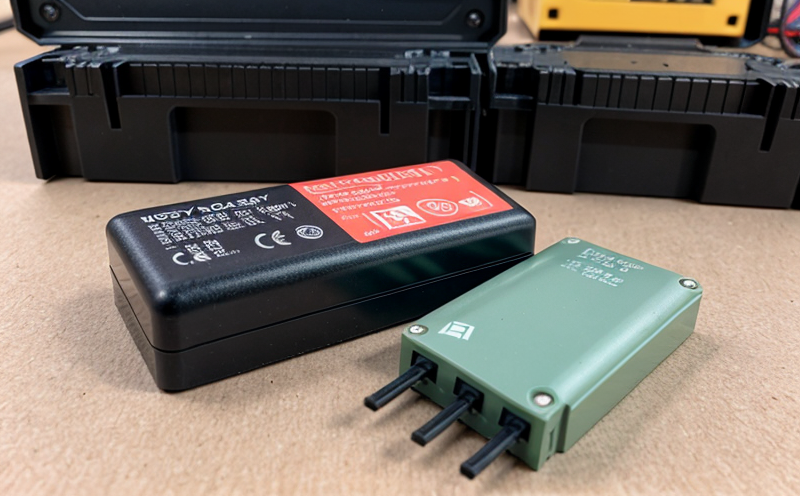EN 50527 Performance Testing of Lithium-Ion Battery Systems for Industrial Use
The CENELEC standard, EN 50527, is a crucial benchmark for ensuring the safe and reliable performance of lithium-ion battery systems (LIBS) in industrial applications. This standard addresses the specific needs of industrial users by providing detailed guidelines on how to test these batteries under various stress conditions that they might encounter during their operational lifecycle.
The testing protocol outlined in EN 50527 is designed to evaluate the performance, durability, and safety features of LIBS used in demanding environments such as energy storage systems (ESS), uninterruptible power supplies (UPS), and vehicle propulsion. The standard focuses on parameters that are critical for industrial applications, including thermal stability, electrical resistance, and cycle life.
One of the key aspects of EN 50527 is its emphasis on real-world stress testing. This includes simulating conditions such as temperature extremes, high current discharge rates, and deep discharge cycles. By subjecting batteries to these rigorous tests, manufacturers can ensure that their products meet or exceed industry standards for reliability and safety.
The standard also covers the evaluation of battery modules and packs, which are essential components in large-scale industrial applications. The testing process involves assessing the electrical characteristics, thermal performance, and mechanical integrity of these assemblies. This ensures that the entire system operates efficiently and safely under various operating conditions.
Another important feature of EN 50527 is its requirement for continuous monitoring during tests. This allows for real-time assessment of battery behavior, enabling early detection of potential issues before they escalate into failures. Continuous monitoring also provides valuable data that can be used to improve the design and performance of future generations of LIBS.
The testing procedures defined in EN 50527 are not only stringent but also highly precise. This ensures that the results obtained from these tests accurately reflect the true capabilities and limitations of the batteries being tested. The standard specifies exact test durations, temperature ranges, current levels, and other critical parameters to ensure uniformity across different laboratories.
By adhering to EN 50527, manufacturers can demonstrate compliance with international standards and gain a competitive edge in the global market. This is particularly important given the increasing demand for sustainable energy solutions that are both reliable and safe. The testing process not only helps identify potential weaknesses but also provides a roadmap for continuous improvement.
The benefits of conforming to EN 50527 extend beyond mere compliance; they contribute significantly to enhancing product quality, reliability, and safety. By following this standard, manufacturers can ensure that their products meet the highest industry standards, thereby building trust with customers and stakeholders. This is especially crucial in industrial applications where downtime can be costly and potentially dangerous.
- Enhanced Reliability: Testing under real-world conditions ensures that batteries perform consistently across various operating scenarios.
- Improved Safety: Continuous monitoring helps detect potential hazards early, reducing the risk of catastrophic failures.
- Increased Efficiency: The detailed test protocols provide insights into how to optimize battery performance and extend their operational life.
- Better Compliance: By adhering to international standards like EN 50527, manufacturers can ensure their products are suitable for global markets.
In conclusion, the EN 50527 standard is an indispensable tool for ensuring the safe and reliable performance of lithium-ion battery systems in industrial applications. Its rigorous testing protocols provide valuable data that can be used to improve product quality and reliability, ultimately enhancing customer satisfaction and trust.
Why It Matters
The importance of EN 50527 cannot be overstated, especially for industries where the performance and safety of battery systems are paramount. In sectors such as energy storage, uninterruptible power supplies, and vehicle propulsion, the reliability and safety of lithium-ion batteries can directly impact operational efficiency and safety.
For instance, in large-scale industrial applications like ESS, any failure could lead to significant disruptions in power supply, potentially causing financial losses and even safety hazards. Similarly, in uninterruptible power supplies used in critical infrastructure, the reliability of the battery is crucial for maintaining uninterrupted service during power outages.
The EN 50527 standard ensures that these batteries are rigorously tested to meet stringent performance criteria. This not only enhances their operational efficiency but also improves safety by identifying potential weaknesses early on. By adhering to this standard, manufacturers can ensure that their products perform consistently and reliably under various operating conditions.
The importance of EN 50527 is further highlighted by its role in promoting sustainability. As the demand for sustainable energy solutions continues to grow, the reliability and safety of battery systems play a crucial role in ensuring that these technologies are both effective and environmentally friendly.
In summary, the EN 50527 standard matters because it ensures that lithium-ion batteries used in industrial applications meet the highest standards of performance and safety. By adhering to this standard, manufacturers can build trust with customers and stakeholders, ultimately enhancing their reputation and market position.
Customer Impact and Satisfaction
The implementation of EN 50527 testing has a profound impact on both manufacturers and customers. For manufacturers, adhering to this standard ensures that their products meet the highest international standards for performance and safety. This not only enhances product quality but also provides valuable data for continuous improvement.
For customers, the benefits are equally significant. By purchasing products that have been tested according to EN 50527, they can be confident in the reliability and safety of these batteries. This is particularly important in critical applications such as uninterruptible power supplies used in hospitals or data centers, where downtime could lead to serious consequences.
The standard also contributes to increased customer satisfaction by ensuring that products perform consistently across various operating conditions. This reduces the risk of unexpected failures and enhances overall trust in the brand. In conclusion, EN 50527 testing is a vital tool for manufacturers and customers alike, providing peace of mind and confidence in the performance and safety of lithium-ion battery systems.





